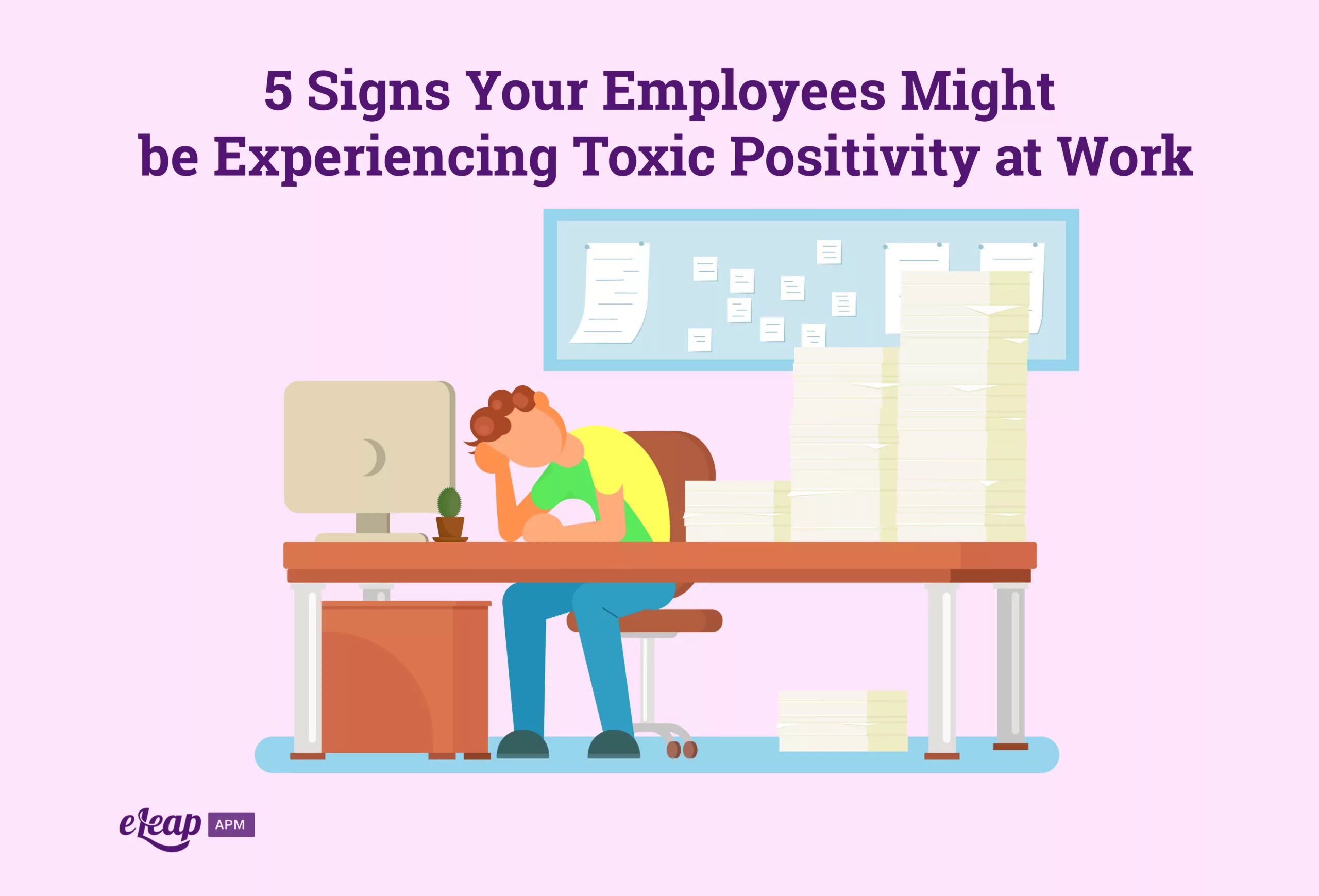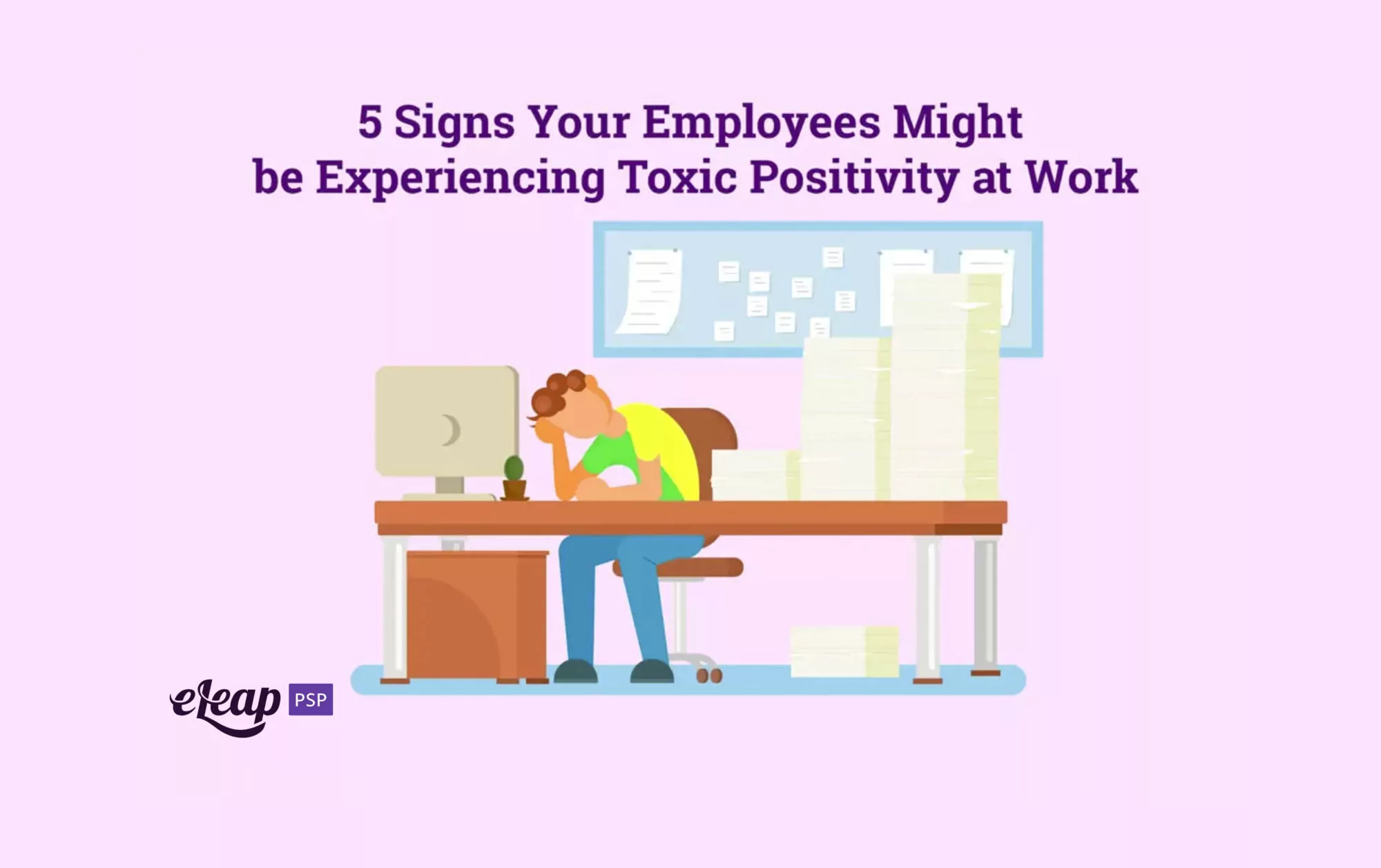5 Signs Your Employees Might be Experiencing Toxic Positivity at Work

Believe it or not, positivity can be a bad thing. That’s right, too much positivity in the workplace might not seem like something you need to worry about. But toxic positivity at work can be detrimental to your employees and is something you should strive to avoid. Toxic positivity might sound like a strange term because it can be tricky for us to wrap our heads around how something positive can be toxic. Chronic positivity is a trend at the moment, both outside the workplace and within it. And it can actually be very harmful to your employees. For this reason, it’s important that leaders know how to spot signs of toxic positivity and how to avoid it in the workplace. Explore how eLeaP’s Performance Management Platform can simplify evaluations, boost productivity, and drive measurable results.

What is Toxic Positivity?
Like it sounds, toxic positivity is the belief that everyone should always try to have a positive mindset, no matter the circumstances. This can be something that is enforced upon yourself or enforced upon others. It’s the mentality that everyone should always be trying to be happy, no matter what is going on in their personal lives. In contemporary society, toxic positivity has very much become a trend. We see it almost everywhere these days, and the workplace is no exception to that rule. When surrounded by toxic positivity, it’s easy for many individuals to fall into the trap of believing that there’s something wrong with them if they don’t feel happy all the time.
Now, being an optimistic person in general and striving to live life with a positive mindset is certainly a good thing. But there’s a point where it crosses over into toxic territory; sometimes, that line can be very thin. Toxic positivity isn’t just being generally optimistic, it’s the belief that you should reject negative emotions, even when they’re entirely understandable.
In many circumstances, feeling negative emotions is the right reaction to a certain situation. Pushing those justified emotions to the side in favor of forced happiness isn’t healthy. Toxic positivity can cause many employees to feel ashamed of their justified negative emotions, which can perpetuate a toxic work culture overall. The eLeaP PulsePoint system enables your employees to provide genuine feedback about their day without fear of reprisal. Take eLeaP for a 30-day free trial and see how we help organizations build resilient workforces.
Are Your Employees Experiencing Toxic Positivity at Work?
It can be difficult to determine whether or not employees may be subject to toxic positivity at work. But toxic positivity can have a detrimental effect on the overall productivity, engagement, and satisfaction of your workforce. It’s also quite contagious, meaning that, just like a negative work environment, toxic positivity can spread dangerously quickly. If you notice any of the following, it may be time to start implementing some steps to counteract toxic positivity.
Coworkers Are Always Telling an Employee to Cheer Up
If you notice an employee expressing genuine concerns at work only to be responded to with pleas to cheer up or try to see the bright side, that’s a warning sign of toxic positivity. If something understandably upsetting or worrying is happening in an employee’s life, it’s ok for them to feel some negative emotions surrounding it. For example, if an employee is stressed regarding an upcoming deadline and tells a coworker about this stress, only to be responded to with dismissal of their concerns, that’s a red flag. If your employees are expressing understandable or justified negative emotions. Try listening to their concerns and responding with understanding. This will help them to deal with their negative feelings appropriately and move past them.
Leadership Doesn’t Acknowledge Hardships
When hardships occur, negative emotions are bound to come up. These negative emotions are justified in such situations and should be treated with care and concern. Of course, we don’t want to encourage employees to constantly bring their home life problems to the workplace, but in some circumstances, it’s unavoidable. If an employee is experiencing serious family problems, telling them not to express those emotions or telling them they should try to be more positive about the situation can be quite unnerving, upsetting, and detrimental. If you notice other employees or leadership dismissing justified hardships, it’s time to step in.
Unemployment Concerns are Dismissed
During the Covid-19 pandemic, this was a prevalent starting point for toxic positivity. In certain circumstances, unemployment concerns are very genuine and should be treated as such. Thankfully, the worst of our unemployment worries surrounding the pandemic is over. But it just goes to show that unprecedented circumstances can affect almost anyone and cause legitimate unemployment concerns. Dismissing these concerns and encouraging an employee to see the Brightside or just not worry is a sign of toxic positivity in the workplace. Any worries about losing a job are entirely justifiable. It’s scary to think you could lose your job anytime! Furthermore, if a company is struggling or falling upon hard times in any way, be wary of leadership that doesn’t disclose such situations to employees. If your workforce is looking for guidance regarding your company’s future or their jobs, it’s best to be as transparent as possible without instilling unnecessary fear. All too often, such concerns are disregarded, which only adds to overall worry and does nothing for workplace culture.
Toxic positivity can negatively affect the workforce, and it’s far more common in the workplace than one might initially think. The signs of toxic positivity are everywhere, and if it’s noticed, human resources or leadership should step in to do what they can to address the issue. Often, dismissing genuine negative emotions or concerns can lead to negative outcomes in your workforce. It’s all too common for leaders to be so preoccupied with nipping negativity in the bud that they forget to look out for toxic positivity altogether. Both circumstances are harmful, so make sure that your organization doesn’t succumb to the pitfalls of toxic positivity in the workplace.